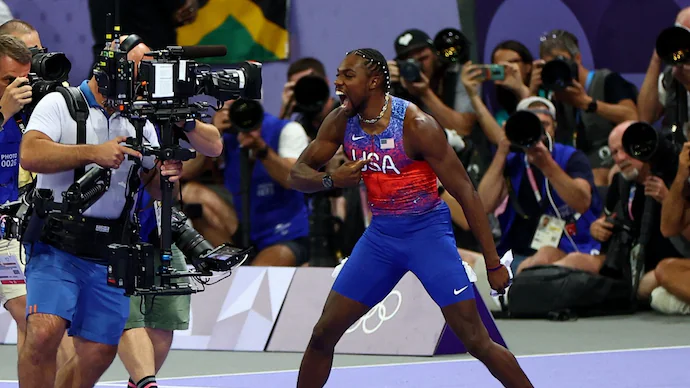American Noah Lyles won the Olympic men’s 100m title by five-thousandths of a second from Jamaica’s Kishane Thompson in a dramatic photo finish at Paris 2024.
Showman Lyles overhauled his rivals in the second half of the race to triumph by the finest of margins in a personal best 9.79 seconds.
That was the same time as Olympic debutant Thompson, who led for most of the race, but Lyles produced a spectacular finish to successfully begin his bid for a potential four golds at these Games.
The United States’ former world champion Fred Kerley took bronze in 9.81, edging out South Africa’s Akani Simbine for the podium.
After a lengthy wait behind the start line to a backdrop of dramatic music in a frenzied atmosphere at Stade de France, all eight finalists finished within 0.12 seconds of Lyles in a remarkable race.
Such was the standard of the final – which Great Britain’s Zharnel Hughes and Louie Hinchliffe failed to reach – Italy’s reigning champion Lamont Marcell Jacobs was run out of the medals and another Jamaican rising star, Oblique Seville, finished last in 9.91.
In the end it was Lyles, an athlete who thrives on the sport’s grandest stages and who won three golds at last year’s World Championships, who sprinted away in celebration once the official result appeared on the big screen.
The 27-year-old repeatedly rang the victory bell by the side of the track after establishing himself at the pinnacle of the sport, before he targets further success in the 200m and relay events.
“You couldn’t have asked for a bigger moment,” Lyles told BBC Sport.
“I had to take every round as it was and I was a little upset after the first round so I came with the aggression, and after I ran 9.83.
“I hope you guys like Noah because I got a lot more coming!”
Lyles continues to deliver on big ambitions
Lyles has remained outspoken and unflinching in his belief that he has the on-track ability and off-track aura to replace Usain Bolt as the new superstar of men’s athletics.
The American has talked the talk but he continues to back it up when it matters most.
Lyles last year became the first man since Bolt in 2015 to win a 100m and 200m world double, before completing a golden treble in the 4x100m relay.
Lyles claimed in the build-up to the Paris Games that he would look to add the 4x400m to that haul in the French capital, and he hinted at his form when running a 100m personal best at the London Diamond League last month.
But repeating such success on these stages, under intense pressure – much of it self-imposed – is another thing entirely.
He has now become the first American to win an Olympic 100m title for 20 years, since Justin Gatlin in 2004, and asserted himself as the dominant male sprinter of the current generation.
A three-time reigning world 200m champion, he will look to maintain his grip on the sport’s major titles in that event, which starts on Monday.
Should he do so, he will move a step closer to sporting immortality in his pursuit of a historic four golds at these Games.
GB’s Hinchliffe and Hughes come up short
Hinchliffe’s fairytale rise from obscurity less than three months ago to an Olympic 100m debut was already a stunning achievement in its own right.
But the 22-year-old and his coach Carl Lewis both said their goal was to make the final in Paris. When the Briton beat Lyles in a statement introduction in his heat on Saturday that appeared a realistic target.
Even Lewis, with his vast experience as both a nine-time Olympic champion and coach at the University of Houston for the past decade, has been surprised by the remarkable rate of Hinchliffe’s progress during their 12-month partnership.
Unfortunately the final proved a step too far, with Hinchliffe run out of the non-automatic qualifying spots after finishing third behind Seville and Lyles in his semi-final.
“It’s obviously not the result I wanted but I can’t be too hard on myself,” Hinchliffe, already the sixth-fastest British man in history, told BBC Sport.
“I’ll definitely use this experience and I’ll learn from my mistakes, so it is back to the drawing board and we’ll work on it and come back stronger next year.”
It also was not to be for Hughes, who could not set up the opportunity to replicate the breakthrough first global medal he achieved last year – or for Olympic redemption following his false start in the Tokyo final three years ago.
The 29-year-old has not been able to hit the same heights of a 2023 season in which he broke two long-standing British records over 100m and 200m, after this campaign was disrupted by a hamstring injury.
“Obviously I’m disappointed but I know where I am coming from. This is my third 100m. Not making any excuses. Today just wasn’t my day,” Hughes, who will also contest the 200m, said.
“To try to get through the rounds of the Olympics after injuring my hamstring with a grade two tear last month wasn’t that easy, but I dug deep to give myself a chance and that’s what I came here to do.”

